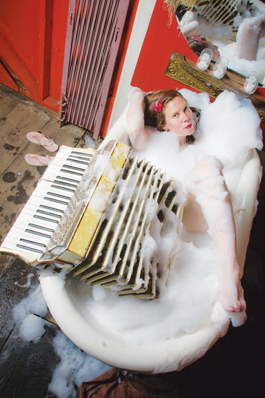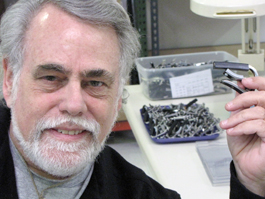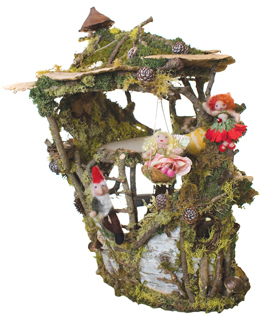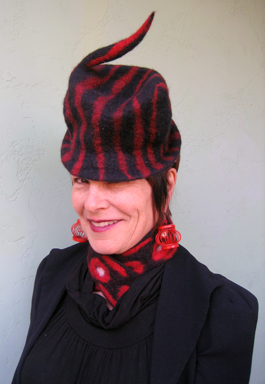home | north bay bohemian index | news | north bay | feature story

Photograph by Ralph Granich
MISS MAY: Accordionist Salane Schultz gets her squeezebox sudsy for spring.
Made in the North Bay
Our highly subjective annual guide to great local gifts
By Dani Burlison, Suzanne Daly, Gretchen Giles, Tori Masucci and Gabe Meline
Squeeze Box Beauties
"Gosh, if you just think of the metaphor, it's pretty crazy," says Renee de la Prade, creator of the 2010 Accordion Babes Pin-Up Calendar. "I mean, this is an instrument that you're pushing in and pulling out while you play it! And you're tickling the buttons with your fingers!"
De la Prade, who's long played her custom "pelvis" accordion on the streets of Fairfax, San Rafael and San Francisco, has a thing for sexy accordions. Last year, she assembled her inaugural calendar of Bay Area beauties blending bare booty and bellows, and she sold out the entire 1,000-print run in less than three weeks. She's sold even more so far this year, making it one of the most popular local calendars around.
The 2010 calendar is full of accordionists in various states of disrobe on front porches, reclining in clawfoot tubs, bent over chairs, strutting at the bowling alley, being fondled by skeletons and, in de la Prade's month, pedaling a 10-speed. Most people think of accordions and picture Lawrence Welk or fat German guys in lederhosen. "For accordion lovers, that's no problem—they think that's sexy, too," says de la Prade. But the juxtaposition of accordions and bare legs often throws people for a fun, feisty loop.
Now a much-talked about seasonal gift, the Accordion Babes calendar maintains a standard of quality ("If I were a man, I couldn't have put this together, because feelings get so easily hurt. 'That photo's not sexy enough.' How do you tell that to someone?"), and comes with a CD of songs from each month's squeeze, including the North Bay's own Amber Lee Baker, Mad Maggie and Roxanne Oliva. It can be ordered for $20 through www.squeezeboxgoddess.com. —G.M.

Photograph by Suzanne Daly
RAISING THE BAR-AND THE PITCH: Rick Shubb gave up his own musical career to follow the fortunes of the capo.
No Fret, No Worries
At his plant in an industrial area of Rohnert Park, Rick Shubb leans back in his chair and plays with the E-shaped metal and rubber device he and his partner Dave Coontz pioneered in 1975. A banjo player and music teacher who gigged with bands during the San Francisco music scene of the '60s, Shubb lacked a decent a fifth-string capo for his banjo, so drew up plans for a prototype.
Coontz, his student and a particularly creative auto mechanic, handmade the first crude prototype with a lever design as opposed to a spring. This allowed the player to apply it quickly while preserving the intonation. After several revisions, they started getting requests from other banjo players, initially selling them by the handful at music festivals. The partners eventually expanded to a more widely used product, a guitar capo. The partners turned their hobby into a business, and the Shubb Capo Company was born.
"Most other capos were unsatisfactory, and finding one to use was kind of like selecting the least of various evils," Shubb recalls. "They were slow to use and put guitars out of tune."
Shubb and Coontz designed a hinge mechanism that imitates the closing of the human hand instead of a vice. Using a durometer, a gauge used in the tire industry, they measured the hardness and pliability of rubber, seeking the material most similar to human flesh.
"You poke it into a finger tip to see what the resilience of the flesh is against the bone and how the finger behaves," Shubb explains. "The metal arm of the capo emulates the bone and the rubber over it the flesh and callus on a guitar player's finger. The moment I clamped it on my guitar neck, I had an 'aha' moment. I knew it was the right design and that this was what I was going to do for my life's work."
Sales increased exponentially with the introduction of their unique guitar capo in 1980, but other interests waned. "My band withered and died because the capos seized all my attention," Shubb shrugs.
Initially based in Sebastopol, the company upsized its plant to Valley Ford and then further expanded into Rohnert Park. The business has grown gradually but steadily at a comfortable rate, staying financially manageable even in poor economic times. Now two thirds of Shubb's sales are international and include distribution to Russia, the Czech Republic, China, Malta, Brazil, Argentina and Mexico, as well as a huge market in Britain and Japan. Instructions are printed in German, French, Spanish, Italian and English.
"My personal goal for the company is to hold the line and to continue to grow at a reasonable level so that you don't move backwards," Shubb says. "I know we have the best product, and I don't want people to forget that because we've been there for so long. But there's a danger when you've been essentially the same for so many years because the product is what it should be so you don't change it."
The current company motto is "Still the best," and Shubb takes a conservative marketing approach to promote solidarity and a continued trust of their products. "All through the growth of the company I've been entirely driven by the satisfaction of the users. Being a musician, starting the company by making stuff to use myself and creating the capo from my ideas has put me in the position of feeling that the players are my people and I'm making stuff for them," Shubb emphasizes. "The most important thing is customer satisfaction. There's a person, just like me, at the other end who wants it to work for them."
This holiday, slip a Shubb into your musician's stocking—or pocket—and listen for the joyful change in their tune. Shubb capos are available at most music stores or check them out online at www.shubb.com.—S.D.
Great Big Batch of Cute
With her unique quirky energy and her impeccable eye for detail, Heidi Iverson is completely out of this world and all sorts of awesome. With a focus on recycled materials and high-quality wool and linen, Iverson's H-Luv Fabrications, run out of a Penngrove studio, provides a giggly sweet and awe-inspiring collection of dolls for the kid in all of us. When not wrapped up in creating and writing her latest knitting patterns or developing softie books, Iverson is busily stitching away at her variety of dolls, including owls, kitties and painfully adorable mushroom people ($34 and up). With their "Anime meets Little House on the Prairie" flare, American Girl Dolls ain't got nothing on H-Luv's original, handmade cuteness! Find them at the Knitterly (1 Fourth St., Petaluma; 707.762.9276), Maude Rare Finds (122 Kentucky St., Petaluma; 707.763.1858), Black Mountain Artisans (11245 Hwy. 1, Point Reyes Station; 415.663.9130) or online at www.h-luv.com.—D.B.
Totally Tool
There's probably a limited group of people for whom you can buy Stanley-knife panties for Christmas and feel like you've done the right thing, but for those friends, Evo Noche has your needs—and your friends' asses—covered. Specializing in simple, original printed designs on linens, aprons, tableware, clothes, lounge wear and "pretty much anything in a house that we can manage to get underneath a screen to print on," Evo Noche has, for over four years, made wearing line drawings of keys, screws, hammers and crescent wrenches totally cool.
Run by Erin Brookey and her husband Jason Roeder, who's drummed for 25 years in the world-renowned proto-metal band Neurosis, one might assume the Santa Rosa–based company would create sludgy, busy designs befitting Roeder's musical output. Instead, the designs are eye-pleasingly sparse and clean, while their mostly utilitarian subjects belie Evo Noche's soft side. Since the birth of the couple's son, children's clothes have appeared with patterns of snails, and a new series of vintage eyeglasses, which both Brookey and her mother collect, have taken off.
Running a business as a married couple has its usual complexities ("Dates turn into business meetings," says Brookey), especially when Roeder is out on tour opening for Ozzy or co-headlining with Mastodon. But it's the tasteful placement and simple patterns that make their wares so appealing. And who can resist a coy double-entendre? Their bestseller is a pair of hot pants covered in screws.
Evo Noche's designs are available locally at Launch (971 Gravenstein Hwy. S., Sebastopol; 707.892.3312), Sprout (177 Healdsburg Ave., Healdsburg; 707.433.7355), the Petaluma Craft Mafia show at the Petaluma Vets Building on Dec. 19, and online at www.evonoche.com. —G.M.
Lifer-Long Learning
Serving some 250 students a semester in disciplines as disparate as neurology, geometry, music appreciation, English, ancient history, modern lit and sociology, the Prison University Project (PUP) is literally one-of-a-kind in California. Based at San Quentin Prison, the PUP uses volunteer instructors to give inmates the equivalent of a full junior college education. Graduates receive their AA degrees, but most importantly they receive skills and learning experiences that might prevent them from returning to prison when—and if—they're ever let out.
Independently funded, the PUP is more affected by inmate numbers and reassignments than it is by the Golden State's fiscal woes, but every nonprofit is feeling the pinch of our Great Recession. The Sunshine Lady Foundation (SLF), however, has proposed a limitless matching grant for the PUP that expires on Dec. 15. This means that no matter how much the PUP raises, SLF will donate the same amount. Why not give the gift of education this holiday season, helping a convicted felon learn more about himself through the words of William Shakespeare or create a new start for himself by mastering calculus?
Randall Countryman, an inmate who served 21 years in prison, reports in the "Alumni News" section of the PUP's quarterly newsletter that he's living now in San Diego, has a car, home, job, church affiliation and friends. "I am striving," he writes, "at being the best example I can possibly be in the free world to show that second chances are worth giving."
To donate to the PUP and help with SLF matching grants, contact them at 415.455.8088 or give online at www. prisonuniversityproject.org.—G.G.
Step on It
Mike Marino spent years working in auto electronics and computer repair while building guitars on the side, but it wasn't until this past decade that the two fields collided. Namely, Marino started making guitar pedals, first for himself to use in his band, the Blues Burners, then for the many people who asked him about his tone. Two years ago, Marino officially launched Tone Candy pedals, and right out of the gate, they started getting outstanding reviews from Premier Guitar and Guitar Player magazines. He was off and running as an exalted technician of tone.
"I made a lot of pedals that way," he says of Tone Candy's formative years, "they were custom pedals for me, but people really liked them, so I figured I might as well come up with a name and make them commercially." He also makes them durable, with Switchcraft jacks, heavy-duty cases, steel potentiometers, Electro-Harmonix switches and military-style circuit boards made in America. Everything is hand-soldered, Marino says, and "I just figured, if I'm going to make it, maybe the parts cost more, but it's worth it."
Marino assembles each pedal himself at his Santa Rosa home, but may have to find larger quarters with the sudden success of his most recent creation, the Spring Fever reverb pedal. "It sounds almost identical to the 1963 Fender Reverb unit, and no one's been able to do it yet. That's what these stores have been telling me that are buying it," he says. "This one might take off and put me on the map."
Tone Candy's overdrive pedals have been noted for maintaining their sound even at lower volumes. Importantly, they pass the player's test—Marino himself uses each pedal with the Blues Burners before offering it commercially. "I have other pedals that I haven't released, like delay pedals," he teases, "so there'll be future releases." Tone Candy pedals are available at Zone Music (7884 Old Redwood Hwy., Cotati; 707.664.1213), Music Biz (1422 Mendocino Ave., Santa Rosa; 707.545.7009), Bananas at Large (1504 Fourth St., San Rafael; 888.900.1959) and online at www.tonecandy.com.—G.M.

Photograph by Michael Amsler
SPRITELY: Lucille Miles' professional directive for dusting her fairy houses? 'Turn them upside down and shake them,' she laughs.
Pure Whimsy
"I always wanted a craft business," Lucille Miles says matter-of-factly, "so I decided to go into the fairy business." Using natural materials she collects on her daily walks with her two Jack Russell terriers around the Junior College in her Santa Rosa neighborhood, Miles' fairy business, Forest Whimsy, is something of a big business. Selling for between $250 and $400, these intricately constructed dwellings for imaginary folk can stand as high as 30 inches and feature rooms, furnishings, porches, chimneys and other accoutrements, almost all of them made solely from natural materials that she's either found or purchased at the San Francisco flower mart.
The rarest of her regular items is that precious oddity known as the fake mushroom. "I pick them up wherever I can," she says. "They're very hard to find." Why not just make them as she does other objects, using wool in a dry felting technique? "The fairy houses are hard enough," she laughs.
Miles got her start in the tough realities of the imaginary world when her daughter, now a high school freshman, was a second grader. The girl was entranced by the idea of fairies, and Miles would often nap with her in the backyard after the two had counted all the many fairies in the trees. Her daughter's friends also loved fairies, so Miles got together with some other mothers to create a handcrafted house to hold the creatures. While the other moms presumably went on to other pursuits, Miles got the fairy-house bug big-time.
Each abode is different, prompting one to wonder if there is a fairy-house formula of any kind. "It totally depends on the first twig I pick up," Miles says. "The house is determined by the shape of the branches and the twigs." While she admits that at least half of her customers are middle-aged women and that she does produce less domestic motifs for little boys—like gnome-drawn carts replete with felted fruit—her whimsys are really made for an endless population. "There is always," she pronounces, "a new crop of four-year-old girls." Forest Whimsy products can be found at Kaleidoscope Toys (2421 Magowan Drive, Santa Rosa; 707.545.8697), Susan's Storeroom (239 San Anselmo Ave., San Anselmo; 415.456.1333) or online at forestwhimsy.net.—G.G.
Deadopoly
As many Deadheads moved into yuppiedom in the 1980s and 1990s, Grateful Dead ties, golf tees, mousepads and wines caused a sudden shift in what being a fan of the Dead was about. Perhaps Don Henley was thinking of this when he sang about the "Deadhead sticker on a Cadillac" in his hit "The Boys of Summer," swinging into lame acceptance with the next line, "Don't look back, you can never look back." In other words, why embrace the ideals of your youth when there's money to be made?
The Grateful Dead merchandising machine is still cranking out product for those with every volume of Dick's Picks already on their BMW's CD changer, but at least it's more of home and hearth than stock and bond. Namely, the Dead-themed variant on the classic Parker Brothers board game Monopoly, created by Bob Weir's friend Debbie Gold and overseen by Weir himself. Throw on your favorite live version of "Dark Star," roll the J's and roll the dice, folks, 'cause the Grateful Dead version of Monopoly is here.
In addition to possessing an awkward name, Grateful Dead-opoly falls into the same category as every other Monopoly takeoff before it. (North Bay locals had our own in the late '80s with "Sonopoly.") Properties are bought in the form of classic albums, jail is rendered as being "off the bus," railroads are famous music venues and "Karma" and "Rex Foundation" cards instruct such goofiness as "'Truckin'' Hits #1 in Turlock—Advance Four Spaces." The money is printed with each band member's face, the playing tokens are either instruments, a bus or Weir's dog, the background is tie-dyed and it comes with an official Grateful Dead-opoly VIP All-Access lanyard pass.
I know what your real question is: What's Boardwalk? Usually reserved in these types of offshoot games for properties of high prestige, in Grateful Dead-opoly, it's the band's enduring 1970 album American Beauty. Let the arguing begin ("Aoxomoxoa deserves far better than Vermont Avenue, man!") and buy Grateful Dead-opoly for $35 online at www.dead.net.—G.M.
Riding Writing
All North Bay residents know someone on fire for cycling. What better way for hardcore bike lovers to keep up on the latest group rides, tours and first-hand cycling adventures than to read about them in a hip, fun, grassroots cycling magazine? Founded by Gran Fondo director Carlos Lopez, 'Bike Monkey' magazine offers informative, often hysterically funny and always unpretentious articles that even beginning cyclists can comprehend and get excited about. Run by longtime locals with longtime bike addictions and printed on all recycled paper, Bike Monkey is the gift that keeps on giving. At $14 for a one year, quarterly subscription and noggin' warming beanies at $15 each, Bike Monkey is a budget stocking stuffer that cyclists of all levels will be stoked about. www.bikemonkey.net.—D.B.
Très Chic!
Twin sisters Michelle and Christina Wilson have a passion for fashion. Yet they didn't just dream about opening their own clothing store; they did it. Ooh La Loft opened in September 2008 in downtown Petaluma. To further expand their boutique, the twins relocated to the former site of Joe's A-1 Bakery this past October.
Their hip 2,000-square-foot boutique, which appropriately includes an upstairs loft, holds rows of elegant designer dresses, plush shoe-shaped chairs for trying on heels and an impressive selection of recycled jeans. While they carry brands like Marc Jacobs, Citizens of Humanity and BCBG, the twin co-owners also support local designers by selling their items, like Christina Olympia's jewelry or Coquette's silk dresses.
To the Wilson sisters, running their own business is a way of protecting the local economy, as well as the environment. Making a conscious effort to keep textiles out of the landfills, they have set up a system in which customers can sell their quality recycled clothing to Ooh La Loft in return for cash or trade. "We wanted to have a store that was in the best interest of the environment and included fashion," says Michelle. "Recycling clothing is our contribution to the environment and our local community." 109 Petaluma Blvd. N., Petaluma. 707.769.7787.—T.M.
Pedal Pretty
Who doesn't love handmade, functional art? Furthermore, who doesn't love a way to carry this art around by bike? Lucie White, the mastermind and craftswoman behind Santa Rosa based Luce Goods has set the trend for North Bay hipsters with her fabulous bags and hats. Fashioned after the musette, a WW II shoulder satchel, Luce Goods Lucette Bags ($60) are each one-of-a-kind, constructed of recycled fabric with a variety of lively and often amusing prints and colors. Each Lucette Bag comes complete with an outer pocket, a tab to attach your bike light onto and a carabiner hook that fastens to belt loops while you ride across town looking totally stylish and cool.
With batches of Luce Goods cycling hats custom made for local cycling companies like SoulCraft, Sycip and Custom Frame Builders, Luce Melon Hats ($30) are available for individual purchase as well, as are the cycling caps with ear flaps more formally known as Melon Sorbet Hats ($40). You can soon find these kick-ass, one-of-a-kind scores at Sycip (111 Fifth St., Santa Rosa; 707.542.6359) and the Bike Peddler (hats only, 605 College Ave., Santa Rosa; 707.571.2428). In the meantime, order directly at www.flickr.com/photos/lucegoods. Custom bags are also available!—D.B.
Lickable
Sensuous Beauty's bodycare products are so delicious, it is difficult to resist the urge to pour them into a bowl and gobble them up like a dairy-free sundae. Made with all natural, plant-based ingredients, essential oils and in some cases even chocolate, the line includes products like Milky Oat Bath ($10.40), Bay Rum Aftershave and Cologne ($18) for men and, my personal favorite, Honey Rose Kissing Balm ($12). Made by hand in Sebastopol by the ladies who brought us that town's Sensuality Shoppe, Sensuous Beauty products not surprisingly also include an entire line of massage oils and aphrodisiacs such as Chocolate Body Paint ($10) and Aphrodisiac Love Nectar ($10), which are sure to entice your lover into the warm confines of your bed this winter. While Sensuous Beauty products are available at grocery stores and specialty retail outlets, they're reliably found at the Sensuality Shoppe (2371-A Gravenstein Hwy. S., Sebastopol; 707.829.3999) or online at www.sensuousbeauty.com.—D.B.

Courtesy Phyllis Beals
TOPPER: Phyllis Beals is perhaps the best advertisement for her own work.
High Hats
Artistry, whimsy and craft define the decorative hats handmade by Phyllis Beals at her home studio in Santa Rosa, and perhaps the advertisement for her haberdasher handiwork is Beals herself, hardly ever seen without one of her smart chapeaus atop her head. "I feel naked without a hat. I'm always wearing one," Beals says, "and I sometimes forget that I even have one on."
Beals, who drives a sea-foam green 1957 Morris Minor, is a pert, stylish woman whose fascination with hats goes back to childhood, when her family owned a trunk of vintage hats from the '20s and '30s. Making them came later. While a teacher's assistant in the design department at UC Davis, she took part in a project called "Hats in a Hurry," making five wearable hats from celluloid, lampshades and even men's underpants. Beals remembers, "People would say, 'You could sell those hats! I want to buy one!' And that's basically how it started.'"
That was 20 years ago, and Beals has made and sold countless hats since, mostly from felt, that have been worn by everyone from Twiggy to Nancy Pelosi. Recently, she's started making her own felt and she's acquired a vintage 1920 straw-braiding machine for making authentic art deco weaves. She then adds a dash of vintage buttons and ribbons or "whatever seems to call to me and says, 'This would be great in a hat.'"
Selling for between $90 and $350, Beals makes eye-catching headwear to turn any modern gal into a silent-film star. Beals' hats can be bought at the Sonoma County Museum's gift shop (425 Seventh St., Santa Rosa; 707.579.1500) or by contacting the milliner herself at www.phyllisbealshats.com.—G.M.
Send a letter to the editor about this story.
|
|
|
|
|
|